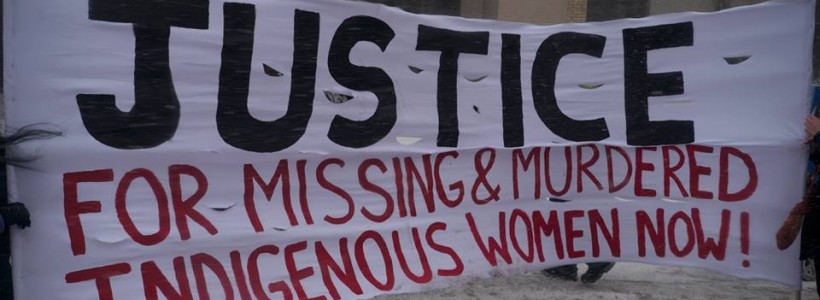Dr. Shauneen Pete: The Limits of a National Inquiry into Missing and Murdered Indigenous Women and Girls
On August 3, 2016 Indigenous and Northern Affairs Canada Minister, Carolyn Bennett, and Federal Justice Minister, Jody Wilson-Raybould announced the Terms of Reference for the National Inquiry on Missing and Murdered Indigenous Women and Girls, as well they announced the names of the five Inquiry Commissioners. The Commissioners are mandated to examine the system issues that contribute to violence directed toward Indigenous women and girls. This includes an examination of the role that the Indian Act plays in creating an environment conducive toward violence. While the Commissioners will have the ability to make decisions on the strategies and processes they will utilize as they undertake the national inquiry over the next two years, the recommendations will not be binding.
Within hours of the announcements criticism toward the terms of reference were already circulating through social media. The most prominent of the concerns were related to the perceptions of the limitations of the Terms of Reference (TOR).
While the TOR Mandate states, “The commission is also directed to examine and report on the impacts of policies and practices of government institutions. These include institutions such as policing, child welfare, coroners and other government policies, practices or social/economic conditions.” The TOR provide no specific mandate to the commissioners toward investigating police (mis)conduct in relation to past and on-going investigations into the disappearance and murder of Indigenous women and girls.
Amnesty International released a statement in response to the announcement (www.amnesty.ca). Amnesty raised two concerns. The first was that the TOR “fails to make it clear that policing will be carefully and thoroughly examined”. Their second concern was that the TOR “offer little concrete assurance to family members who believe that investigations into their loved one’s death or disappearance were never taken seriously”.
Like Amnesty International, the Federation of Saskatchewan Indigenous Nations Vice- Chief, Heather Bear urges the provincial government to declare in their Order-In-Council authority for the commissioners to examine police services, as well as the coroner’s office, the provincial child welfare system and both adult and youth correctional facilities. Families called for the inquiry to include an examination of police misconduct in relation to responsiveness to initial complaints when a loved one has gone missing. In their view, racism in the police force impacts on response time of investigations as well as the quality of those investigations.
Federal Minister Carolyn Bennett reassured participants at yesterday’s press conference that the commissioners will have the same powers as a court; they can refer cases for further investigation; and they can call witnesses to testify (including police officers). For many of the family members, the Ministers reassurances did not go far enough – how are we to trust that a recommendation for further investigation would be taken up respectfully and thoroughly when it was not done so originally?
For many Indigenous peoples, the police services themselves are sources of racial inequality in treatment and responsiveness; yet it is often denied by the very same police services that perpetuate racist actions. In December 2015, Regina Police Chief, Troy Hagen said, “There is absolutely no reason for me to believe that we have racists within the Regina Police Service”, the denial of racism in the police service is problematic. Additionally, I am deeply disturbed by the cases in British Columbia, Ontario and Quebec, where members of police services and the criminal justice system are themselves perpetrators of violence directed toward Indigenous women. How can we be assured that these very same police officers do not retaliate against families as their calls for further investigation are formalized?
This inquiry must investigate the role that police services play in perpetuating violence toward Indigenous peoples generally, and Indigenous girls and women specifically. If the inquiry does not do so, then the inquiry is seriously limited in its ability to correct systemic oppressions.
– Dr. Shauneen Pete
Dr. Shauneen Pete is the Executive Lead of Indigenization at the University of Regina. She is also an Associate Producer for RezX TV and Associate Editor of RezX Magazine.


